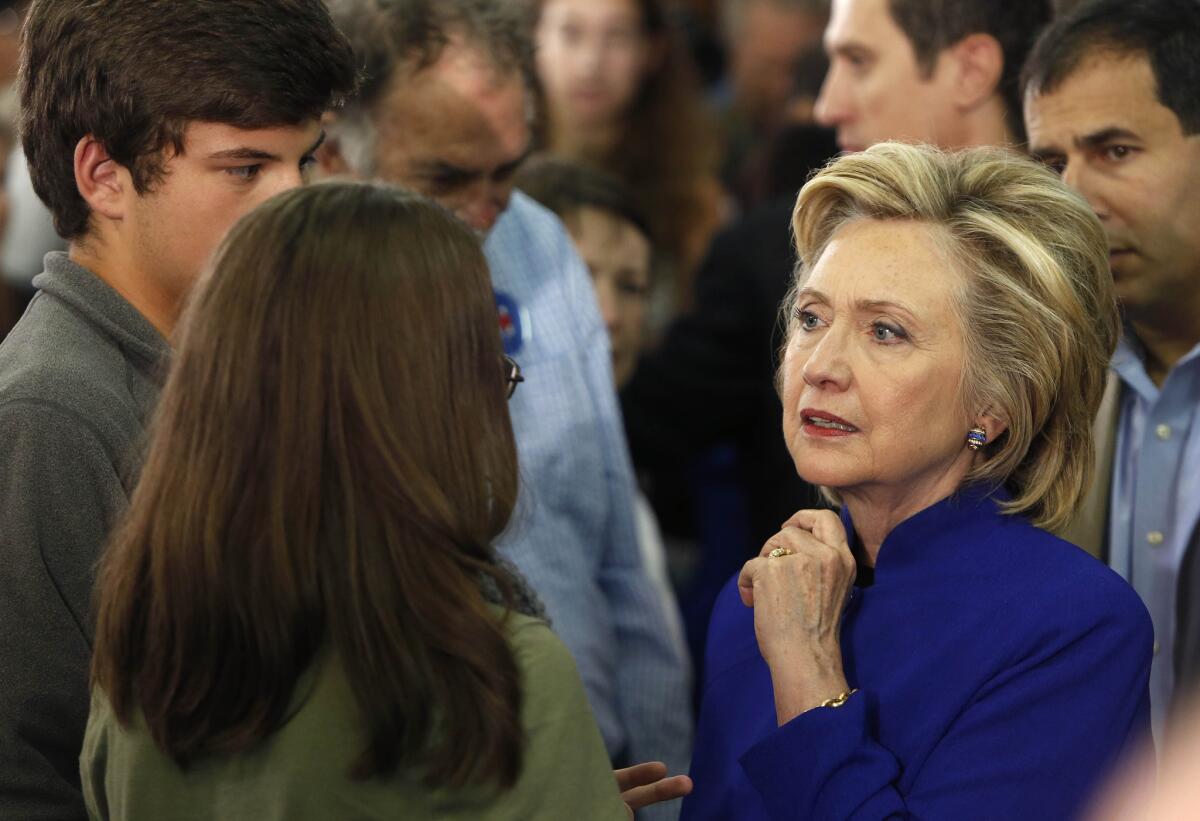Clintonâs campaign-trail moment with manslaughter convict highlights drug abuse issue

Democratic presidential front-runner Hillary Rodham Clinton visited New Hampshire on Tuesday, in part to talk about the heroin abuse crisis that voters have repeatedly told her about on campaign stops throughout the state.
Reporting from Keene, N.H. â On Aug. 28, 1990, Carl Babbitt, in the midst of a cocaine- and alcohol-fueled blackout, killed a man. Almost a quarter-century later to the day, he stood 50 feet from Hillary Rodham Clinton and revealed his past.
âYou look at me as a regular person. But I served 11 years in prison,â he began.
As unpredictable as New Hampshire town hall meetings can be for presidential candidates, it was nevertheless a jaw-dropping start to an audience memberâs question.
Babbitt, 54, said he was thrown out of his home by his mother as a child and later sexually abused by a foster parent.
âI turned to drugs and alcohol to cover that pain,â he recalled. He would eventually seek treatment but was denied care because he lacked insurance, and six months later stabbed a man to death during a fight. He served 11 of the 15 to 18 years he was sentenced to for manslaughter and was released from prison in 2000.
âIâve been out clean and sober for 15 years, and I cannot find a full-time job because every time they run a background check, âYouâre a convicted felon,ââ he told Clinton, adding that it is a roadblock that he and many others face.
âWhat would you suggest we do?â he finally asked.
This wasnât a standard New Hampshire town hall meeting, and on a day of headlines about her email server and her attacks on Republicans, it was precisely the kind of issue Clinton had come to Keene to address.
TRAIL GUIDE: All the latest news on the 2016 presidential campaign >>
Heroin abuse in particular has been an issue that voters have repeatedly confronted Clinton about on the campaign trail, and on Tuesday, she offered a window into a possible presidential role as convener-in-chief, discussing potential policy specifics and seeking more from a panel of locals with different perspectives on the crisis, including the county sheriff and treatment center and hospital representatives.
The first stop Clinton made this year in the state as a candidate was in Keene. And there for the first time she heard about an issue that had reached almost epidemic status in New Hampshire.
âI have to confess, I was surprised,â Clinton recalled Tuesday. âI did not expect that I would hear about drug abuse and substance abuse and other such challenges everywhere I went.â
Hands shot up throughout the school event room when the audience was asked whether someoneâs drug abuse had affected their lives. According to statistics provided by Clintonâs campaign, New Hampshire has the highest per-capita rate of addiction and second-lowest treatment capacity in the nation, with 320 drug-related deaths last year alone.
On Saturday, hundreds attended a candlelight vigil at New Hampshireâs Capitol in Concord to remember victims of drug overdoses. WMUR-TV reported two weeks ago that more than 400 people turned out in Manchester, the stateâs largest city, at the first police forum on the heroin abuse crisis in the city.
âWe know this is happening, but itâs not yet a big issueâ in the campaign, Clinton said as she opened what the campaign called a community forum on substance abuse and opiate addiction. âSome people question why, since Iâm running for president, would I be talking in New Hampshire about substance abuse?â
âReally, itâs simple for me. Thatâs what people talk to me about.â
Since her initial April visit, Clintonâs campaign staff have been holding meetings in the state and online to discuss possible policies she could offer as president to address substance abuse issues.
After the initial discussion, Babbitt, who two years ago earned a degree in drug counseling and now works as the volunteer director for a churchâs after-prison ministry program, asked Clinton about how he could get nonprofit status to fund it and whether Pell Grants could be used to help provide education for people in and out of jail.
Clinton cited studies that found those who are educated while in prison had sharply reduced recidivism rates. She said that once people had âpaid their debt to societyâ they should not only have voting rights restored, but be âgiven a chance to present yourself for jobs, for housing.â
âAt the end of the day, people can make their own judgment. But you shouldnât be automatically disqualified,â she said, referring to a campaign that seeks to remove questions about a criminal record in the early stage of a job application process.
In an interview after the event, Babbitt said prison was the best thing that had happened to him.
âIf it werenât for prison, Iâd be dead,â he said.
But the Worcester, Mass., native, who now lives in Keene and said he had never before attended a campaign event, said he hopes Clinton âfollows through on her promises.â
âOther candidates should get involved, because itâs not only a community problem, itâs a national problem,â he said. âWhen they get out, if we donât help them ... they wind up right back in jail, costing us as taxpayers.â
For more campaign coverage, follow @mikememoli
More to Read
Get the L.A. Times Politics newsletter
Deeply reported insights into legislation, politics and policy from Sacramento, Washington and beyond. In your inbox three times per week.
You may occasionally receive promotional content from the Los Angeles Times.











